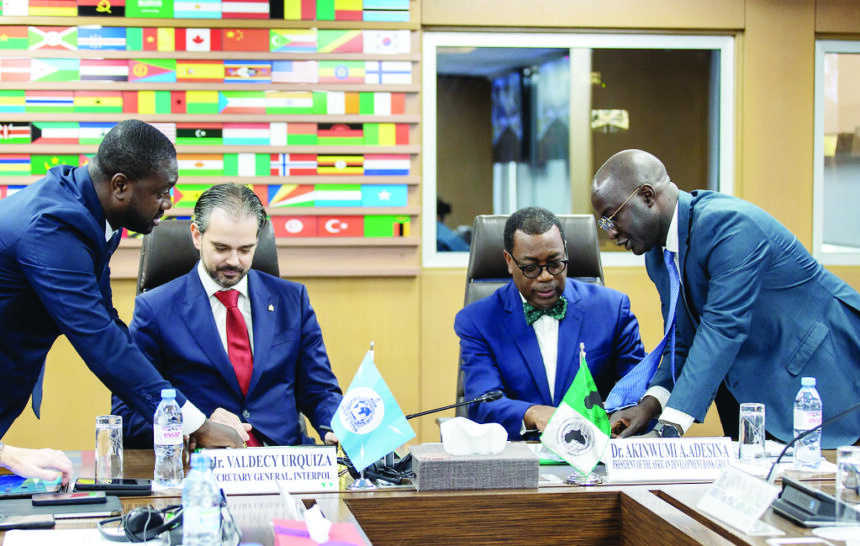The African Development Bank Group has taken a significant step forward in its fight against corruption and financial crime by signing a Letter of Intent with the International Criminal Police Organisation (Interpol) last week. The bank group is the first multilateral development bank to establish such a collaboration with Interpol.
The Letter of Intent was signed on Wednesday, 19 February 2025 by African Development Bank Group president Akinwumi Adesina and Interpol secretary general Valdecy Urquiza, who visited the bank’s headquarters in Abidjan.
The partnership will enhance collaboration between the Bank’s Office of Integrity and Anti-Corruption and Interpol’s Financial Crime and Anti-Corruption Centre. It will focus on sharing expertise, enhancing investigative capabilities and developing preventive measures against emerging financial crime threats, including cybercrime, anti-corruption measures and counter-terrorism financing.
This initiative comes as Africa faces significant challenges of illicit financial flows, estimated at nearly US$90 billion annually—a loss of resources that could otherwise be invested in critical development needs including water, sanitation, health, food and energy infrastructure.
As an institution that deploys approximately US$10 billion annually in development financing, with the majority going to government projects, the African Development Bank Group brings crucial insight into regional financial flows and development challenges, Adesina said.
“As the world’s most transparent financial institution for two consecutive editions [according to Publish What You Fund’s assessment of sovereign portfolios], we maintain zero tolerance for corruption and terrorism financing,” said Adesina.
“This partnership demonstrates our commitment to protecting development resources and ensuring they reach their intended beneficiaries,” he said. “By joining forces with Interpol, we are strengthening our capacity to help African countries build robust systems against money-laundering and financial crime.”
Rapid advancements in digital technology have also led to an increase in internet-enabled financial crimes. According to Interpol’s 2024 Global Financial Fraud Assessment, business email compromise, romance baiting, phishing, and other online frauds pose growing threats to Africa’s digitalised economy.
Urquiza, who was elected to his position in November 2024, said, “Corruption and financial crime are among the biggest obstacles to economic and social development in Africa and around the world. The evolving nature of financial crime, particularly in the digital environment, requires strong partnerships between law enforcement and financial institutions. Interpol’s closer relationship with the African Development Bank Group will help law enforcement agencies and financial institutions across Africa tackle increasingly sophisticated financial crime threats.”
“Corruption and financial crime are among the biggest obstacles to economic and social development in Africa and around the world,” said Interpol’s Urquiza.
Adesina said the bank will continue to tackle these challenges by; building capacity and supporting African countries in strengthening transparent and accountable governance and strong institutions capable of driving inclusive and sustainable growth and resilient economies; strengthening Know Your Customer and Due Diligence systems to prevent and to fight fraud and corruption; and ensuring the bank’s resources are used for their intended purposes in a transparent and accountable manner.
The high-level Interpol delegation that accompanied Urquiza included Silvino Schlickmann, director of governance and Paule Ouedraogo, head of Interpol’s regional bureau.


